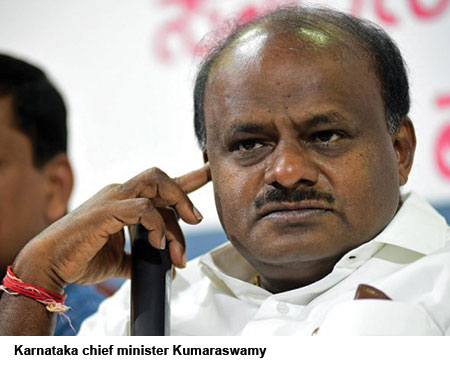 The decision taken by the shaky JD (S)-Congress coalition government last July (2018) to promote 1,000 English-medium government primary schools across Karnataka (pop.67 million) after decades of hostility to English of successive state governments — and complete bar on teaching English in classes I-V in government primaries — has proved to be one of the few successes of the 13-month-old coalition government. On May 29, when 992 English- medium government schools began admitting children, the enthusiastic public response took education ministry officials by surprise — 16,000 students in 23 districts were admitted into class I. This number is expected to swell as the education ministry is yet to collate information from the remaining seven districts.
The decision taken by the shaky JD (S)-Congress coalition government last July (2018) to promote 1,000 English-medium government primary schools across Karnataka (pop.67 million) after decades of hostility to English of successive state governments — and complete bar on teaching English in classes I-V in government primaries — has proved to be one of the few successes of the 13-month-old coalition government. On May 29, when 992 English- medium government schools began admitting children, the enthusiastic public response took education ministry officials by surprise — 16,000 students in 23 districts were admitted into class I. This number is expected to swell as the education ministry is yet to collate information from the remaining seven districts.
Under the scheme to introduce English-medium education in government primaries, 1,000 selected schools were divided into English and Kannada medium. The number of new enrolments in the English medium sections was 16,000 cf. 4,000 in Kannada-medium.
This overwhelming preference of bottom-of-pyramid low-income households for English medium schooling has vindicated champions of English language education who contended that it’s unjust to deny low-income household children education in the language of upward mobility, business and industry. “From 1994 under pressure from KDA (Kannada Development Authority) and the vernacular textbooks publishing lobby, promotion of English medium primaries — government or private — was completely banned. Promoters of new private schools resorted to routinely signing declarations agreeing to abide by the medium of instruction policy of the state government, while actually teaching in the English medium. This arrangement eminently suited Karnataka’s notoriously corrupt educrats and school inspectors who extracted rents and pay offs from private school promoters while a whole generation of government school children were cruelly deprived the opportunity of learning English in their early years which handicapped them in high school and higher education,” says the principal of a private English medium budget school in Bangalore, speaking on condition of anonymity.
Despite a three-judge bench of the Karnataka high court ruling (2008) that parents of school children have the right to choose the medium of instruction, under pressure from the KDA, which has a minister in the state Cabinet, the state government continued to prohibit English language learning in the primary years. In 2012, a five-judge bench of the Supreme Court upheld the judgement of the Karnataka high court and confirmed that parents have the fundamental right to choose the medium of instruction in school education (State of Karnataka & Anr. vs. Associated Managements of (Government Recognised Unaided English Medium) Primary & Secondary Schools & Ors.)
Meanwhile, the natural outcome of successive state governments proscribing English language learning in government schools, has been the rise of Karnataka’s private budget schools (PBS) which provide — or claim to provide — low-cost English medium education to low-income households. During the past decade the number of PBS has doubled to 13,000 statewide with an aggregate enrolment of 3.5 million children even as government primaries have emptied. In 2018, 28,847 government primaries with less than ten children had to be merged with neighbouring schools.
To his credit after making a realistic assessment of these ground realities shortly after the new JD (S)-Congress coalition government was sworn in on May 23, 2018, chief minister H.D. Kumaraswamy became the first major politician of Karnataka to confront KDA and the Kannada language lobby by decreeing the promotion of 1,000 English medium government primaries on a trial basis. The overwhelming public response to English medium government primaries, which admitted their first batches on May 29, has vindicated his overdue initiative.
While accepting the Supreme Court judgement and the huge public response to English medium government primaries, KDA spokespersons express their determination to promote Kannada as a compulsory second language in all schools — including CBSE, CISCE and international — statewide. “It’s important to safeguard our language and culture. If Kannada is not compulsorily taught from the primary level there’s grave danger that it will die out. While we accept that English must be taught — and taught well — from class I, but we are determined that all schools — regardless of board affiliation — will also teach Kannada and the state government has accepted our suggestion,” says KDA chairman S.G. Siddaramaiah, a renowned poet and writer.
If this new proposal of the KDA is accepted, another round of courtroom wars are likely to erupt as under Article 30 (1) of the Constitution, all minorities have a fundamental right to establish and administer education institutions of their choice — and they are certain to choose their own vernacular mother tongue as their second language.
Sruthy Susan Ullas (Bangalore)




























